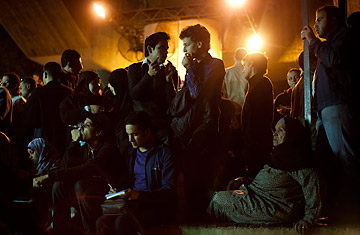
Hundreds gather in Cairo on March 8, 2011, to see presidential candidate Amr Moussa speak
For the Egyptians who led the revolt that ousted President Hosni Mubarak, some changes are happening too quickly. It's not that the youth groups that organized the protest movement want to lose their revolutionary momentum — quite the contrary. But they want more time for Egyptians to consider and discuss the constitutional changes that the transitional military government will put to a referendum vote on March 19, and for new political parties to emerge and develop their platforms. The Supreme Military Council, however, is in no mood to wait and has ignored calls to postpone the vote. It has also warned against plans to stage a mass protest against the referendum on March 18.
In a crucial test of Egypt's democracy in the wake of Mubarak's ouster, some 40 million citizens (about half the population) are eligible to vote in the referendum. They'll have the opportunity to cast a straight up-or-down vote on nine changes to the currently suspended 1971 constitution, which the military council has proposed to enable a democratic election for a new President and parliament.
Some of the proposed changes conform to the revolution's demands, such as limiting a President to two four-year terms and removing provisions that effectively restricted candidacy to members of Mubarak's National Democratic Party (NDP). Still, the changes prevent dual nationals or anyone with a foreign parent or foreign wife from running — the latter also implying that the presidency is restricted to men. The changes would also scrap the decades-old emergency laws that enabled Mubarak to run a police state. Under the proposed changes, such laws would require approval by referendum after six months. And a yes vote on March 19 would also implement judicial oversight of elections, a key step toward eliminating the ballot fraud that was routine under Mubarak.
But many democracy activists have questioned the process adopted by the military leaders of tweaking the constitution to allow elections to go ahead later this fall. Presidential candidate and Nobel laureate Mohamed ElBaradei wants a new constitution, not changes to the old one, but has created confusion by calling for both a no vote and a boycott. "New regime = new democratic constitution reflecting national will. Keeping Mubarak's constitution, even temporarily, is insult to revolution," he wrote in one tweet amid a flurry on the issue. "Why rush @ the expense of democracy?!" he said in another. Arab League chief Amr Moussa, another presidential candidate who is widely considered a front runner for the job, has also urged a strong no vote.
The yes campaign has the backing of the Muslim Brotherhood and remnants of Mubarak's NDP. As the most organized and entrenched of the political players now crowding the scene, they stand to gain most from the proposed changes, particularly the holding of early elections. Everybody else in the opposition seems to be urging a no vote.
But Mohammed Attia, the judge who heads the army-appointed committee that drafted the amendments, warned March 15 that if the no vote carries the day, the generals may simply draft their own rules for an early election. That's a scenario nobody wants to see, given the country's long history of military rule. The military council has set itself a six-month deadline to hand over power to an elected civilian government, but if it has to go back to the drawing board, presumably its time at the helm will be extended.
That's not how most democracy advocates see it. They want the creation of a presidential council to shepherd Egypt through the transitional period until a new constitution can be drafted, followed by parliamentary and presidential polls. Some groups say such a council should be elected; others say that it should be appointed. But all of them — even the Muslim Brotherhood — agree that the generals' mandate should not be extended. These are confusing times in Egypt as a country unshackled from censorship revels in debate. But will too much talk simply push the military into taking its own action? That depends on what the voters decide on March 19.
